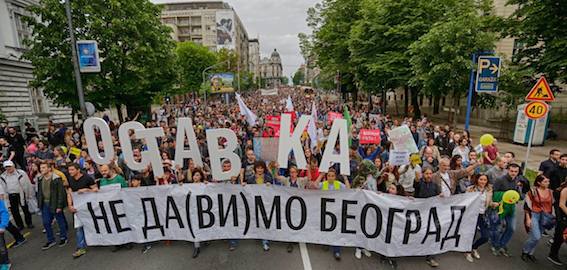

The Belgrade Waterfront, labeled as a project of national importance by the Serbian government, is an approximately 2,7 billion Euro investment into a brownfield part of Belgrade aiming to transform it into upscale apartment blocks and shopping centers on the riverbank. The project itself remains contested not only by local architectural associations concerned with the viability of foreseen mega-construction, but also by citizens who bring into question the lack of transparency in a controversial joint venture contract between the government of the Republic of Serbia and a private company from the United Arab Emirates.
Indeed, upon a closer inspection of the contract it can be observed that the foreign investor is obliged to invest roughly 150 million, with a 150 million loan, so just above 10% of the project’s costs, while securing the ownership of 68% of equity.
The initiative ‘Ne Da(vi)mo Beograd’ (literally Let’s not drawn Belgrade, but also an allusion to We will not give up on Belgrade) has been pointing to numerous flaws and controversies of the ongoing project for over a year. However, it was not before the above-mentioned events of the election night that the initiative had seen its first major success.
The flattening of several family-owned businesses and a restaurant in Hercegovačka Street took place in the middle of the night. According to witnesses, this was done by people armed with baseball bats, wearing masks and using unmarked cars and excavators, who locked eyewitnesses in a hangar and confiscated their mobile phones and ID cards. In the aftermath of the event, one of the witnesses died in hospital, while some of the oppositional political parties demanded an urgent probe into his death amidst the report of his medical mistreatment.
What was probably most shocking was the complete lack of response by the Belgrade police that has purposely declined numerous calls made by the assaulted citizens to investigate events in Hercegovačka Street. Therefore, in a report published by the Serbian Ombudsperson, Saša Janković, the police was accused of being complicit in the incident.
The government controlled media remained silent over the incident thus failing to inform Serbian citizens on the night where group of masked thugs de facto suspended state’s sovereignty over a part of its territory.
This is why Serbia’s Public Information Commissioner, Rodoljub Šabić called on Belgrade authorities to explain what happened, but the Mayor Siniša Mali denied knowing anything about the incident, while the president of the Belgrade’s municipal assembly, Nikola Nikodijević, questioned whether it even happened. The same day the Commissioner Šabić received threatening messages for demanding that the case should to be investigated.
The failure of the state to protect constitutionally guaranteed rights of its citizens, the government’s shady business deals, the media cover-up of the incident, threats against independent state institutions and finally even open mocking of some public officials seem to have crossed the red line.
In response the grass-root initiative ‘Ne Da(vi)mo Beograd’ staged a massive rally in Belgrade under the title ‘The Masks have Fallen’, demanding the resignations of a number of state officials, including the Police Minister, Nebojša Stefanović, the Mayor of Belgrade, Siniša Mali, the acting Belgrade police chief, Vladimir Rebić, the Communal Police chief, Nikola Ristić, and the President of the City Assembly, Nikola Nikodijević. As a symbolic response to the masked demolition men, some of the protesters came with improvised masks on their heads.
But more importantly, the protestors have publically revealed traditional top-down power structures in the Serbian House of Cards, whereby the government seems to be at liberty to influence reforms through a set of clientilistic networks, informal practices and/or methods of more or less open pressure. At the same time, by gathering more people at the political protests than any oppositional party in the last ten years, the protestors have sent a strong message to the opposition that it is no longer the only credible contender to the political power, at least in Belgrade. Powerful message has been sent also to the EU. With its traditional focus on the smart design of formal institutions, the EU had for years observed the trees and not the whole forest when it comes to the rule of law and democracy development in Serbia. In the future, the EU will have to work more closely with local civil society on monitoring the state of democracy in candidate countries. And finally, the echo of Belgrade protests is already heard in Novi Sad, where 5,000 citizens gathered protesting the politically orchestrated staff dismissal at the RTVojvodina, a provincial public broadcaster.
Before finally giving up to the public pressure, and promising that the state will investigate into the incident no matter how unpleasant the consequences might be for the ruling elite, Serbian Prime Minister Aleksandar Vučić has branded the masked men from Savamala as complete idiots. With their actions, these people have indeed hindered the government’s efforts to open up EU membership negotiations on Chapters dealing with the rule of law and judiciary. They have also undermined citizens’ fragile trust into Serbian state institutions.
But this is probably not what Prime Minister Vučić had in mind when he called these men idiots. Their fault is the fact that they have bluntly disposed the informal way of rule of the Serbian regime. Their nocturnal stunt has brought into the daylight clandestine connections between the state officials, government control media, police, and masked thugs. It is more likely that for Prime Minister these men are complete idiots because they have started a snowball effect.